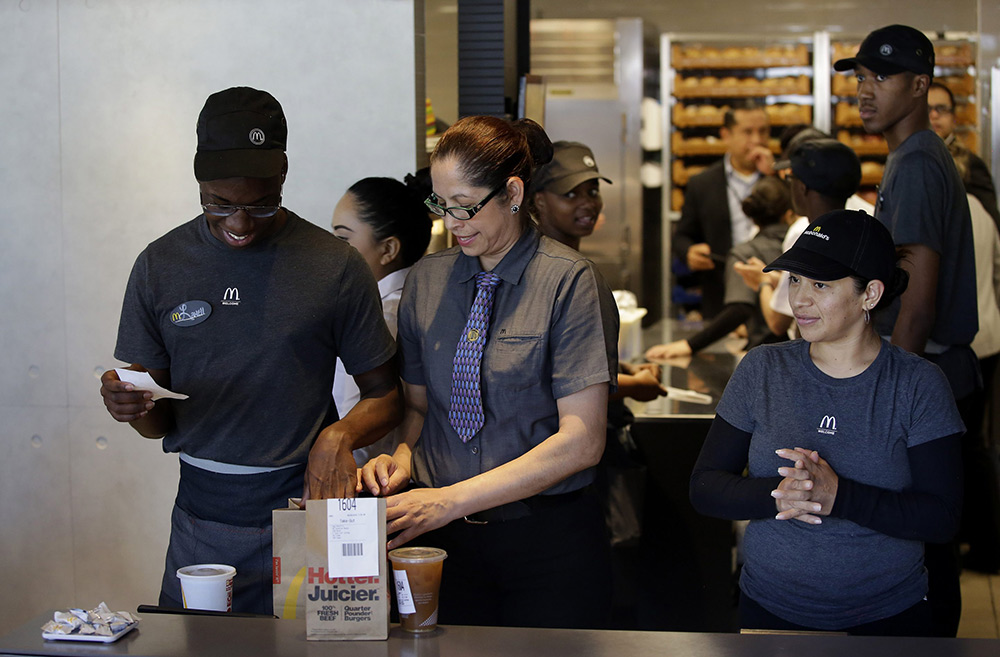
今年年初,和许多美国人一样,我找到了一份新工作。进入麦当劳美国公司人力资源部门的管理岗位让我很兴奋:我认为自己有机会对麦当劳的业务、员工工作以及用户产生重大影响。但在看了一些讲在麦当劳工作的负面头条之后,一些同事质疑了我的决定,怀疑我是否能够实现自己的野心:为人们铺就成功之路。
这种情绪与我成长过程中所认识的麦当劳并不相符,麦当劳是一个可以让人们学习到所需技能、促进自身职业发展的地方,过去它还赢得了 "美国最好的第一份工作 "的名声。更重要的是,如果麦当劳的工作有这么多不足,那在今天竞争异常激烈的就业市场上,麦当劳及其门店为什么还能雇用数十万名餐厅员工呢?
我希望理解一下这种认知差距。因此,我的团队接触了一家同样致力于引导人们走上成功职业道路的组织:美国社区学院协会(AACC)。2015年,我们首次与AACC合作创立了“机会拱门”项目,为65000多名麦当劳员工提供受教育的机会,让他们获得高中文凭和大学学位、学习英语,追求他们的梦想。
今年早些时候,我们再次合作进行了一项劳动力调查,询问了近2000名美国人第一份工作的经历,了解他们在一份工作中最关心的东西、他们的职业如何随着时间的推移取得进步,以及继续教育的价值。
最后的发现令人大开眼界。是的,受访者证实了第一份工作中有竞争力的薪酬和福利的重要性(它也是员工在职业生涯每个阶段都会考虑的关键因素)。但他们也表示,第一份工作能教会他们的软技能也很重要,因为这将有助于他们在未来的道路上取得成功。
软技能,具体来说就是帮助人们在工作中取得成功的行为、习惯和领导特质。技术能力再强、再聪明,如果人们不能与同事相处,不能在最后期限前完成任务,也不能听取反馈意见,他们的职业生涯便会停滞不前。
LinkedIn发布的《2019年全球人才趋势报告》发现,近十分之九的招聘人员表示,缺乏软技能是导致新员工达不到要求的原因,这并非偶然。困难之处在于,技术性技能(如会计、工程或护理)可以在学校教授,但软技能却需要通过经验来学习。
调查报告也揭示了员工认为第一份工作必须传授的三类软技能。首先是责任心——理解准时的重要性,完成所有工作职责,对结果负责。其次是团队合作能力——协作能力,以及解决问题和有效清晰沟通的技能。第三是良好的应对能力——积极倾听同事或客户的意见,保持专注,迅速行动、贯彻到底,交付有意义的结果。
调查还发现,在第一份工作中从这三类技能中至少学到一项技能的人,目前有全职工作的可能性要高出19%,有医疗保险的可能性要高出24%,认为自己对生活和工作感到满意的可能性要高出50%。当你把在第一份工作中获得的这些技能与进一步教育结合起来时,积极的结果会呈指数级增长。有一份不错的第一份工作并获得了大专文凭的人,从事一份能带来经济保障的工作的可能性是其他人的两倍,他们对目前工作感到满意的可能性也是其他人的两倍多。
理解这些软技能的长期价值,是麦当劳作为雇主与众不同的地方之一。我很高兴地得知,在第一份工作在麦当劳的受访者中,88%的人说他们学会了如何开展团队协作(相较而言,美国人明白这一点的总体比例为74%),这也帮助他们之后找到了收入更为稳定、工作满意度较高的工作。这些结果令人鼓舞,但它也成为了我们进步的基础,因此我们还在继续推出有利于员工的新项目。
通过在短期内提供有竞争力的福利来支持员工,同时传授有利于他们长期在职场上取得成功的技能,雇主可以帮助自己的员工茁壮成长。这是麦当劳将继续关注的领域,我们希望我们的数据也能激励其他雇主这样做。(财富中文网)
蒂凡妮•博伊德是麦当劳美国公司的首席人事官。
译者:葛仲君
今年年初,和许多美国人一样,我找到了一份新工作。进入麦当劳美国公司人力资源部门的管理岗位让我很兴奋:我认为自己有机会对麦当劳的业务、员工工作以及用户产生重大影响。但在看了一些讲在麦当劳工作的负面头条之后,一些同事质疑了我的决定,怀疑我是否能够实现自己的野心:为人们铺就成功之路。
这种情绪与我成长过程中所认识的麦当劳并不相符,麦当劳是一个可以让人们学习到所需技能、促进自身职业发展的地方,过去它还赢得了 "美国最好的第一份工作 "的名声。更重要的是,如果麦当劳的工作有这么多不足,那在今天竞争异常激烈的就业市场上,麦当劳及其门店为什么还能雇用数十万名餐厅员工呢?
我希望理解一下这种认知差距。因此,我的团队接触了一家同样致力于引导人们走上成功职业道路的组织:美国社区学院协会(AACC)。2015年,我们首次与AACC合作创立了“机会拱门”项目,为65000多名麦当劳员工提供受教育的机会,让他们获得高中文凭和大学学位、学习英语,追求他们的梦想。
今年早些时候,我们再次合作进行了一项劳动力调查,询问了近2000名美国人第一份工作的经历,了解他们在一份工作中最关心的东西、他们的职业如何随着时间的推移取得进步,以及继续教育的价值。
最后的发现令人大开眼界。是的,受访者证实了第一份工作中有竞争力的薪酬和福利的重要性(它也是员工在职业生涯每个阶段都会考虑的关键因素)。但他们也表示,第一份工作能教会他们的软技能也很重要,因为这将有助于他们在未来的道路上取得成功。
软技能,具体来说就是帮助人们在工作中取得成功的行为、习惯和领导特质。技术能力再强、再聪明,如果人们不能与同事相处,不能在最后期限前完成任务,也不能听取反馈意见,他们的职业生涯便会停滞不前。
LinkedIn发布的《2019年全球人才趋势报告》发现,近十分之九的招聘人员表示,缺乏软技能是导致新员工达不到要求的原因,这并非偶然。困难之处在于,技术性技能(如会计、工程或护理)可以在学校教授,但软技能却需要通过经验来学习。
调查报告也揭示了员工认为第一份工作必须传授的三类软技能。首先是责任心——理解准时的重要性,完成所有工作职责,对结果负责。其次是团队合作能力——协作能力,以及解决问题和有效清晰沟通的技能。第三是良好的应对能力——积极倾听同事或客户的意见,保持专注,迅速行动、贯彻到底,交付有意义的结果。
调查还发现,在第一份工作中从这三类技能中至少学到一项技能的人,目前有全职工作的可能性要高出19%,有医疗保险的可能性要高出24%,认为自己对生活和工作感到满意的可能性要高出50%。当你把在第一份工作中获得的这些技能与进一步教育结合起来时,积极的结果会呈指数级增长。有一份不错的第一份工作并获得了大专文凭的人,从事一份能带来经济保障的工作的可能性是其他人的两倍,他们对目前工作感到满意的可能性也是其他人的两倍多。
理解这些软技能的长期价值,是麦当劳作为雇主与众不同的地方之一。我很高兴地得知,在第一份工作在麦当劳的受访者中,88%的人说他们学会了如何开展团队协作(相较而言,美国人明白这一点的总体比例为74%),这也帮助他们之后找到了收入更为稳定、工作满意度较高的工作。这些结果令人鼓舞,但它也成为了我们进步的基础,因此我们还在继续推出有利于员工的新项目。
通过在短期内提供有竞争力的福利来支持员工,同时传授有利于他们长期在职场上取得成功的技能,雇主可以帮助自己的员工茁壮成长。这是麦当劳将继续关注的领域,我们希望我们的数据也能激励其他雇主这样做。(财富中文网)
蒂凡妮•博伊德是麦当劳美国公司的首席人事官。
译者:葛仲君
Earlier this year, like many Americans, I started a new job. Stepping into the top human resources role for McDonald’s USA was exciting: I saw it as an opportunity to have a big impact on the business, on people’s lives, and in the communities McDonald’s serves. But some colleagues questioned my decision after seeing some not-so-favorable headlines about McDonald’s as an employer. They challenged me on whether I would be able to fulfill the ambition that had always driven me: to set people up for successful futures.
That sentiment didn’t fit with the McDonald’s I knew growing up, a place where people could learn the skills they needed to advance and grow in their careers, that eventually earned the reputation of “America’s best first job.” What’s more, if jobs under the Golden Arches were so limiting, how were McDonald’s and its franchisees still able to hire hundreds of thousands of restaurant employees in today’s incredibly competitive job market?
I wanted to understand this perception gap. So my team reached out to an organization that has a shared interest in guiding people along successful career pathways: the American Association of Community Colleges (AACC). We first worked with the AACC in 2015 when we created Archways to Opportunity, a program that has increased access to education for over 65,000 McDonald’s crew members—helping our people earn high school diplomas and college degrees, learn English as a second language, and pursue their dreams.
Earlier this year, we teamed up again on a Workforce Survey that asked nearly 2,000 Americans about their first job experience—about what’s most important to them in a job, how their careers evolved over time, and the value of continued education.
What we found is eye-opening. Yes, survey respondents confirmed the importance of competitive pay and benefits at a first job (a key consideration for employees at every stage of their career). But they also said it was important that a first job teach them soft skills that would help set them up for success down the road.
Soft skills are the behaviors, habits, and leadership traits that help people succeed at work. No matter how deep their technical skills or how bright they are, if they can’t get along with colleagues, make deadlines, or listen to feedback, they’ll find their careers stalled.
It’s no accident that LinkedIn’s Global Talent Trends report found in 2019 that nearly nine in 10 recruiters say a lack of soft skills is what causes a new hire to fall short. The challenge is that while technical skills can be taught in a classroom—think accounting, or engineering, or nursing—soft skills are learned through experience.
The Workforce Survey identified three categories of soft skills that employees believe a first job must teach. First is responsibility—everything from understanding the importance of being on time, to completing all the duties associated with a job, to being accountable for results. Second is teamwork—including skills like collaboration, problem solving, and effective and clear communication. Third is responsiveness—actively listening to colleagues or customers, staying focused, and acting quickly and thoroughly to deliver meaningful results.
The survey also found that people who learned at least one skill from each of these three categories at their first job are 19% more likely to have a full-time job currently, 24% more likely to have health insurance, and 50% more likely to report a feeling of life and job satisfaction. When you pair these skills from first jobs with further education, the positive outcomes grow exponentially. People who had a good first job and earned an associate’s degree are twice as likely to be working at a job that creates financial security, and more than twice as likely to report a current feeling of job satisfaction.
Understanding the long-term value of these soft skills is part of what sets McDonald’s apart as an employer. I was happy to learn that 88% of survey respondents whose first job was at McDonald’s said they learned how to work as part of a team (compared to 74% of Americans overall)—which led to improved financial security and job satisfaction later in life. These results are encouraging, but they're also a benchmark we hope to grow in the future as we continue to introduce new programs that benefit our crew members.
By offering competitive benefits to support employees in the near term, while also teaching the skills that will prepare them for successful careers over the long term, employers can help their people thrive. That’s what McDonald’s will continue to focus on—and we hope this data inspires other employers to do the same.
Tiffanie Boyd is chief people officer of McDonald’s USA.






